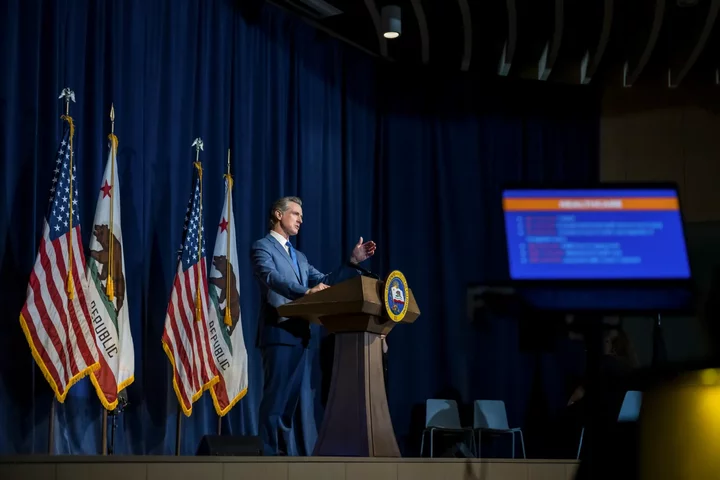Gov. Gavin Newsom unveils his revised budget proposal for 2023-24 during a press briefing at the state Natural Resources Agency in Sacramento on May 12, 2023. Photo by Rahul Lal, CalMatters
California’s estimated budget deficit has grown by $9 billion since January, Gov. Gavin Newsom announced today, though the governor downplayed the severity of its potential impact on critical government services and programs.
During a press conference at the California Natural Resources Agency in downtown Sacramento, Newsom unveiled a revised spending plan that will rely on some additional fiscal gimmicks — including shifting funding sources and internal borrowing — to address a projected $31.5 billion gap in the 2023-24 state budget.
“We have a $31.5 billion challenge, which is well within the margin of expectation and well within our capacity to address,” Newsom said.
Despite the growing shortfall, California’s overall budget is now expected to be $306 billion, including special funds, less than a 1% decline from the current fiscal year, a record $308 billion.
Newsom proposes to close the deficit by shifting $3.3 billion in existing commitments out of the general fund, including paying for $1.1 billion in climate spending and $1.1 billion in college student housing projects with bonds, and pulling back another $1 billion in unused money from programs such as middle class tax refunds and utility bill support for low-income residents.
Under the governor’s plan, the state would also borrow $1.2 billion from special funds and extend a $2.5 billion on managed care health plans to address the spending gap. Extensive savings would remain largely untouched, though Newsom did propose to make a $450 million from one reserve account.
California’s fiscal picture has largely worsened since January, when finance officials projected the state would face a deficit of $22.5 billion. Newsom called it a “modest shortfall” and proposed to delay some spending commitments, reverse recent steps to shore up the state’s fiscal health and shift around funding sources to limit program cuts.
Enduring high inflation, turmoil in the regional banking sector and a showdown in Washington, D.C., over raising the federal debt limit have all deepened the economic headwinds. Monthly tax revenues came in billions of dollars below forecasts this spring, and fears of a recession continue to loom, which Newsom said could reduce state revenues by tens of billions of dollars even in the mildest scenario.
“That is an uncertainty that we must take very seriously and very soberly,” he said.
Adding to the unpredictability, most Californians don’t have to file their income taxes until October because of the intense damage and disruption from winter storms. Officials estimate that $42 billion in payments will be delayed until the new deadline.
The governor’s updated budget proposal kicks off a month of negotiations with the Legislature, which must pass a budget by June 15 to get paid.
Legislative leaders have been largely optimistic about the budget situation, arguing that they have plenty of fiscal tools at their disposal to avoid deep spending cuts. Last month, Senate Democrats pitched raising taxes on large corporations, an idea that Newsom quickly rejected.
With less money to go around, however, the challenge is getting everyone to agree about what should take the hit. Some lawmakers have already raised objections to potential cuts for climate programs and public transit funding that the governor proposed in January.
It will be the first budget process for many of them; nearly a third of the entire Legislature was newly elected in November. And aside from a brief downturn at the start of the coronavirus pandemic, most have faced only surpluses and growing revenues during their tenures. Because of term limits, there are only a handful of legislators who were around during the last recession more than a decade ago.
###
CalMatters.org is a nonprofit, nonpartisan media venture explaining California policies and politics.

CLICK TO MANAGE